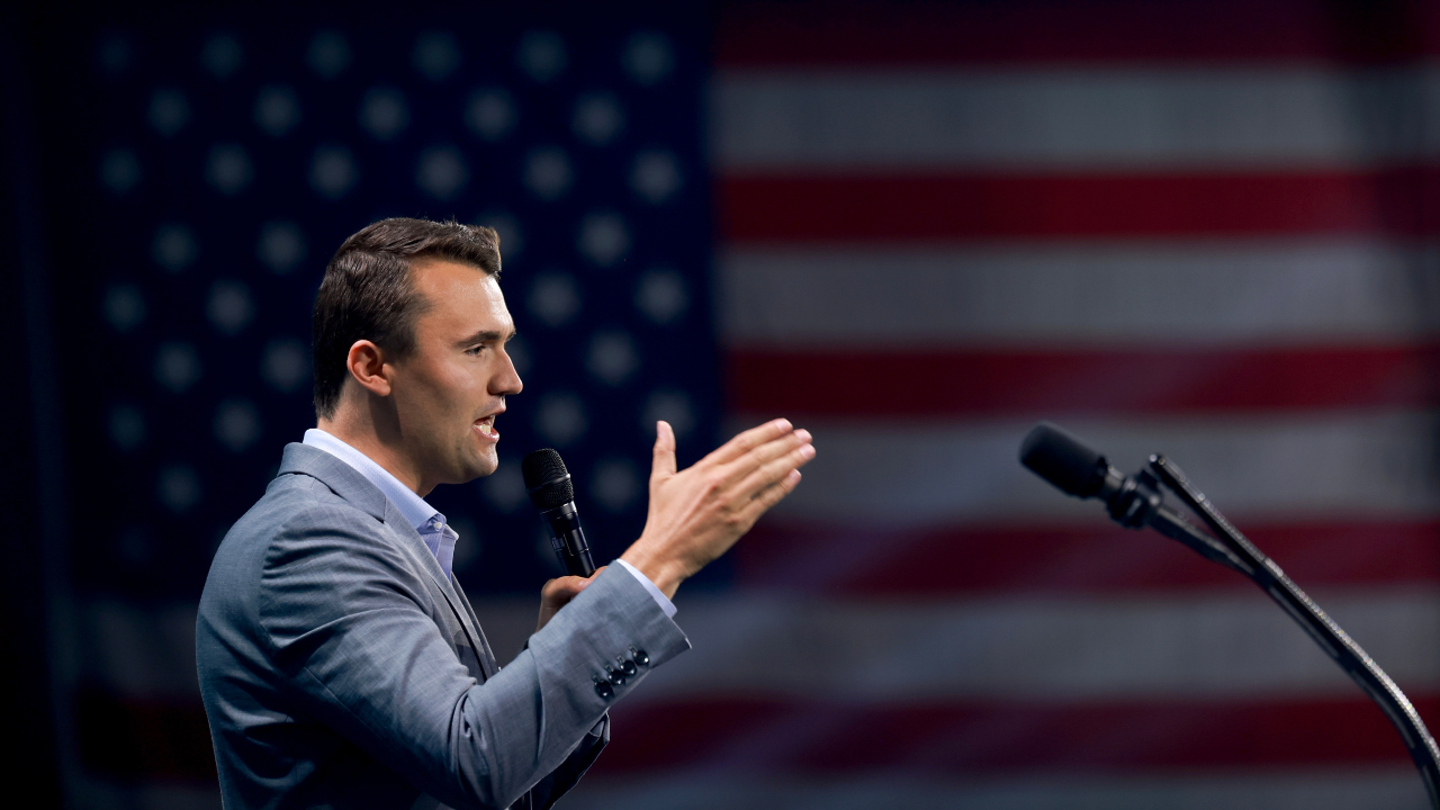
ESPN's Pat McAfee speaks out after Charlie Kirk's assassination: 'Pivotal moment' for America
Entities mentioned:
- Pat McAfee: Righteousness, Moral outrage, Professional pride
- Charlie Kirk: Determination, Influence, Legacy
- Donald Trump: Loyalty, Power, Recognition
Article Assessment:
Credibility Score: 75/100
Bias Rating: 65/100 (Lean Right)
Sentiment Score: 20/100
Authoritarianism Risk: 35/100 (Generally Democratic)
Bias Analysis:
The article leans right due to its focus on conservative figures and framing. It presents sympathetic portrayals of Kirk and Trump, while emphasizing the tragedy of the event.
Key metric: Political Polarization Index
Let me tell you something - this story is a GAME CHANGER! The assassination of Charlie Kirk is like losing a star quarterback in the middle of the season. It's a pivotal moment that could shift the entire political playing field. Pat McAfee, coming off the sidelines, is showing true team spirit by speaking out. He's not just a former punter, he's become a key player in the media game, and his words carry weight. This is fourth quarter, high stakes action, folks! The political arena has become a full-contact sport, and we're seeing the dangerous consequences play out in real-time. It's like we're watching the Super Bowl of American democracy, and tensions are at an all-time high. The big question is: will this tragic play lead to a timeout, where both teams can regroup and remember the rules of the game? Or are we heading into sudden death overtime where the very fabric of our nation's unity is on the line? I'm telling you right now, this is a defining moment in America's political championship, and how we respond will determine whether we emerge as victors or suffer a devastating defeat for democracy itself!

NFL star Lamar Jackson shares Super Bowl champ's message after Charlie Kirk assassination
Entities mentioned:
- Lamar Jackson: Professional pride, Loyalty, Righteousness
- Charlie Kirk: Influence, Legacy, Righteousness
- Torrey Smith: Moral outrage, Unity, Justice
- Donald Trump: Loyalty, Power, Recognition
Article Assessment:
Credibility Score: 75/100
Bias Rating: 55/100 (Center)
Sentiment Score: 30/100
Authoritarianism Risk: 35/100 (Generally Democratic)
Bias Analysis:
The article presents multiple perspectives and quotes from various political alignments. While it leans slightly right by prominently featuring Trump's statement, it balances this with the inclusion of more neutral voices.
Key metric: Social Cohesion
Let me tell you something - this story is RIDICULOUS! We're witnessing a major league shakeup in the political arena, folks. Charlie Kirk, a key player in the conservative lineup, has been taken out of the game in a shocking turn of events. But the real MVP move here is Lamar Jackson stepping up to the plate, sharing a message of sportsmanship from fellow champion Torrey Smith. This is championship mentality, folks! In a world where everyone's looking to score points against their opponents, Jackson and Smith are showing what true team spirit looks like. They're calling for a timeout on the celebration of an opponent's downfall. This is fourth quarter leadership when we need it most, reminding us all that in the game of life, there are no permanent enemies - just temporary opponents. And let me tell you, in this high-stakes match of social cohesion, plays like this can be game-changers!

Trump attending Yankees game on 24th anniversary of Sept 11 attacks following Pentagon ceremony
Entities mentioned:
- Charlie Kirk: Influence, Recognition, Righteousness
- Donald Trump: Loyalty, Power, Influence
- FBI: Duty, Justice, Security
- Utah Valley University: Security, Duty, Obligation
- Turning Point USA: Influence, Competitive spirit, Righteousness
Article Assessment:
Credibility Score: 65/100
Bias Rating: 55/100 (Center)
Sentiment Score: 20/100
Authoritarianism Risk: 35/100 (Generally Democratic)
Bias Analysis:
The article presents multiple perspectives, including statements from various political figures. However, there's slightly more emphasis on conservative voices and reactions.
Key metric: Political Polarization Index
Let me tell you something - this story is an absolute GAME-CHANGER! The political arena just saw a devastating hit that's going to shake up the whole league. Charlie Kirk, a rising star player for Team Conservative, has been tragically taken out of the game in what can only be described as a brutal blindside tackle. This is the kind of play that changes the entire season, folks! The right-wing offense has lost a key player, and you better believe this is going to affect their playbook going forward. We're talking fourth quarter, clock ticking down, and suddenly the star quarterback is down! The political field is in absolute CHAOS right now, with both teams scrambling to adjust their strategy. This isn't just a game anymore - we're in sudden death overtime, and the stakes couldn't be higher. The refs are on high alert, the crowd is in shock, and every player on that field knows that this changes EVERYTHING. Buckle up, sports fans, because this political season just got a whole lot more intense!

LeBron James silent as new China controversy swirls around him
Entities mentioned:
- LeBron James: Ambition, Influence, Legacy
- Chinese Communist Party: Control, Power, Influence
- NBA: Greed, Influence, Self-preservation
- Michele Tafoya: Moral outrage, Justice, Righteousness
- Tim Brando: Indignation, Moral outrage, Professional pride
Article Assessment:
Credibility Score: 70/100
Bias Rating: 65/100 (Lean Right)
Sentiment Score: 25/100
Authoritarianism Risk: 45/100 (Mixed/Neutral)
Bias Analysis:
The article leans right, focusing heavily on criticism of LeBron James and emphasizing potential negative implications. It gives more space to critical voices and frames the issue in a way that questions James' motives and integrity.
Key metric: US-China Relations
Let me tell you something, folks - this is a GAME-CHANGING play in the arena of international relations! LeBron James, the MVP of the NBA, has just fumbled the ball in a crucial fourth-quarter move. His alleged op-ed in China's state-run media is like scoring an own goal in the championship game of US-China diplomacy. The King's silence on this controversy is deafening - it's like he's been benched in the biggest match of his career! This could be a major setback for Team USA in the global influence league. The Chinese Communist Party, playing offense, is trying to draft star players to their roster. Meanwhile, critics like Michele Tafoya and Tim Brando are coming off the bench, blitzing James with hard-hitting tackles on his ethical stance. This is a pivotal moment, folks - will James step up to the plate and address these allegations, or will he let this PR disaster run out the clock? The whole world is watching this high-stakes game unfold!

Dana White says UFC fighters deliberately hide pay from fans to avoid giving 'handouts'
Entities mentioned:
- Dana White: Control, Power, Self-preservation
- UFC fighters: Self-preservation, Security, Pride
- UFC: Greed, Power, Control
Article Assessment:
Credibility Score: 65/100
Bias Rating: 55/100 (Center)
Sentiment Score: 30/100
Authoritarianism Risk: 70/100 (Authoritarian Tendencies)
Bias Analysis:
The article presents multiple viewpoints, including Dana White's perspective and the fighters' lawsuit. However, it leans slightly towards the fighters' side by mentioning the settlement and emphasizing the UFC's financial success.
Key metric: Income Inequality
Let me tell you something, folks - this story is a KNOCKOUT! We're seeing a championship-level power play by Dana White and the UFC, trying to keep their playbook under wraps. The fighters are in a defensive stance, guarding their wallets like it's the last round of a title fight. But make no mistake, this is a high-stakes game where the UFC is running up the scoreboard while the fighters are barely getting off the bench. It's fourth quarter, and the players are calling for a fair shake of the prize money, but the league commissioner is playing hardball. This isn't just a fight in the octagon, it's a battle for the very soul of the sport!

Ex-ESPN host calls on NYC mayor to take 'clearly unwell and violent men' off streets after Charlotte stabbing
Entities mentioned:
- Samantha Ponder: Righteousness, Moral outrage, Security
- Eric Adams: Duty, Security, Control
- Donald Trump: Justice, Power, Influence
- Decarlos Brown Jr.: Control, Fear, Self-preservation
Article Assessment:
Credibility Score: 75/100
Bias Rating: 65/100 (Lean Right)
Sentiment Score: 25/100
Authoritarianism Risk: 55/100 (Mixed/Neutral)
Bias Analysis:
The article leans right, emphasizing public safety concerns and featuring prominent quotes from conservative figures. It focuses on the criminal's history and Trump's call for harsher penalties, without much counterbalance.
Key metric: Violent Crime Rate
Let me tell you something - this story is a GAME-CHANGER! We're seeing a full-court press on public safety, folks. Samantha Ponder is stepping up to the plate, calling for a defensive strategy against violent crime. She's putting the ball in Mayor Adams' court, demanding he bench the 'unwell and violent' players causing havoc in the Big Apple. Meanwhile, Trump is coming in hot with a Hail Mary pass, pushing for the ultimate penalty flag - the death penalty! This is a high-stakes match, and the scoreboard is showing lives at risk. The justice system's defense is looking shaky, with career criminals running wild like they're in the open field. It's fourth and long for city safety, and officials need to pull out all the stops before we see more tragic losses on the streets!

Kai Trump reacts to death of 'close family friend' Charlie Kirk after Utah campus shooting
Entities mentioned:
- Kai Trump: Loyalty, Duty, Grief
- Charlie Kirk: Ambition, Influence, Legacy
- Donald Trump: Loyalty, Influence, Power
- Tim Tebow: Righteousness, Loyalty, Duty
- Brett Favre: Compassion, Unity, Recognition
- Utah Valley University: Security, Duty, Professional pride
Article Assessment:
Credibility Score: 75/100
Bias Rating: 55/100 (Center)
Sentiment Score: 20/100
Authoritarianism Risk: 35/100 (Generally Democratic)
Bias Analysis:
The article presents a balanced view of reactions from various political affiliations. While it gives prominence to conservative figures, it maintains a neutral tone in reporting the event.
Key metric: Political Polarization Index
Let me tell you something, folks - this is a GAME-CHANGING play in the political arena! Charlie Kirk, a star player for Team Conservative, has been taken out of the game in a shocking turn of events. This is like losing your franchise quarterback in the middle of the Super Bowl! The conservative lineup has lost a key player, and you can bet this will shake up their offensive strategy. We're seeing reactions pouring in from across the political playing field, with even athletes from other leagues weighing in. This tragic event is going to reverberate through the entire league, folks. It's a reminder that in the contact sport of politics, sometimes the hits are all too real. The conservative team will need to regroup, find a new playmaker, and adjust their game plan. This is the kind of momentum-shifting moment that can define a whole season - or in this case, a political era. Stay tuned, because the fourth quarter of this political matchup just got a whole lot more intense!

Yankees hold moment of silence in honor of Charlie Kirk after shooting death in Utah
Entities mentioned:
- New York Yankees: Unity, Recognition, Professional pride
- Charlie Kirk: Influence, Legacy, Competitive spirit
- Donald Trump: Loyalty, Power, Influence
- Turning Point USA: Influence, Competitive spirit, Legacy
Article Assessment:
Credibility Score: 70/100
Bias Rating: 55/100 (Center)
Sentiment Score: 25/100
Authoritarianism Risk: 35/100 (Generally Democratic)
Bias Analysis:
The article presents facts from multiple sources, including both conservative figures and mainstream institutions. However, the prominence given to Trump's statement and sports figures' reactions suggests a slight right-leaning tilt.
Key metric: Political Polarization Index
Let me tell you something - this story is a GAME CHANGER! The Yankees, a true heavyweight in America's pastime, just threw a curveball by honoring Charlie Kirk. It's like they're stepping up to the plate in the culture wars, folks! Kirk, the MVP of conservative youth activism, was taken out of the game way too soon. But his legacy? It's going into extra innings! Trump, the ultimate political coach, is rallying the team with a heartfelt tribute. This is the kind of play that could shift the entire scoreboard of public opinion. We're seeing a major league response to a tragedy that's got both sides of the aisle watching the replay. It's a whole new ballgame in the political arena, and I'm telling you right now, this could be a game-changing moment in the championship series of American politics!

Sports world reacts to Charlie Kirk shooting death: 'Prayers for his family'
Entities mentioned:
- Charlie Kirk: Ambition, Influence, Competitive spirit
- Donald Trump: Loyalty, Power, Influence
- FBI: Duty, Justice, Security
- Utah Valley University: Security, Duty, Professional pride
- Turning Point USA: Influence, Competitive spirit, Righteousness
Article Assessment:
Credibility Score: 65/100
Bias Rating: 55/100 (Center)
Sentiment Score: 20/100
Authoritarianism Risk: 35/100 (Generally Democratic)
Bias Analysis:
The article presents a fairly balanced account, including reactions from various political figures. However, there's slightly more emphasis on conservative voices and Trump's statements.
Key metric: Political Polarization Index
Ladies and gentlemen, we're witnessing a GAME-CHANGING moment in the political arena! The assassination of Charlie Kirk is like a blindside hit that's left the conservative movement reeling. This is a FOURTH QUARTER SHOCKER that's going to reshape the entire playing field! Kirk was a rising star, folks - a true MVP for the right-wing team. His loss is like losing your star quarterback right before the Super Bowl. The political landscape is now wide open, and both sides are going to be fighting tooth and nail to fill this power vacuum. We're talking high-stakes, no-holds-barred action here! The aftermath of this tragedy is going to test the teamwork and resilience of the conservative movement like never before. Will they rally together or fracture under pressure? This is the kind of moment that separates the champions from the also-rans, folks. I'm telling you right now, we're in for a wild ride as both sides gear up for what could be the most intense political showdown of our time!

LeBron James did not pen an op-ed for Chinese state media, according to reports
Entities mentioned:
- LeBron James: Influence, Recognition, Unity
- NBA: Competitive spirit, Influence, Self-preservation
- Chinese state media: Control, Influence, Unity
- Donald Trump: Power, Competitive spirit, Indignation
- Xi Jinping: Power, Control, Unity
Article Assessment:
Credibility Score: 75/100
Bias Rating: 55/100 (Center)
Sentiment Score: 40/100
Authoritarianism Risk: 35/100 (Generally Democratic)
Bias Analysis:
The article presents multiple viewpoints and clarifies misinformation, showing a balanced approach. It includes perspectives from various parties involved, maintaining a relatively neutral stance.
Key metric: US-China Relations
Let me tell you something, folks - this story is a GAME-CHANGER in the international arena! We've got LeBron James, the MVP of diplomacy, stepping up to the free-throw line of US-China relations. But wait, there's a twist! It looks like Team China might have been running a play without LeBron's consent, attributing an op-ed to him that he didn't actually write. This is like calling a foul on a clean block - it's RIDICULOUS! Meanwhile, we've got Coach Trump on the sidelines, trash-talking Xi Jinping like it's the fourth quarter of a championship game. The NBA, still recovering from its 2019 fumble, is trying to get back in the game with some preseason matchups in China. I'm telling you right now, this is high-stakes geopolitical basketball, and every move counts in this heated rivalry between Team USA and Team China!